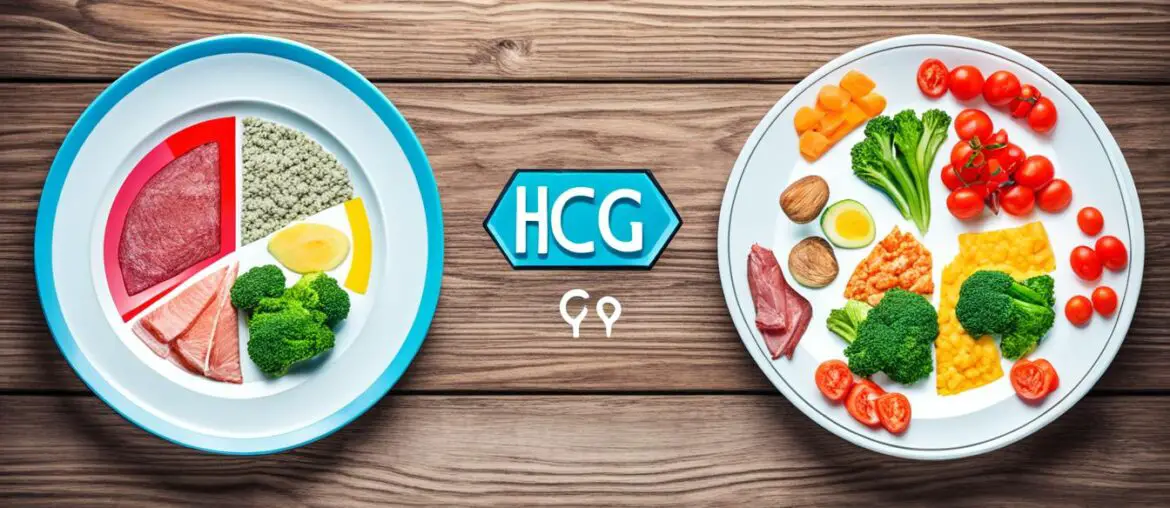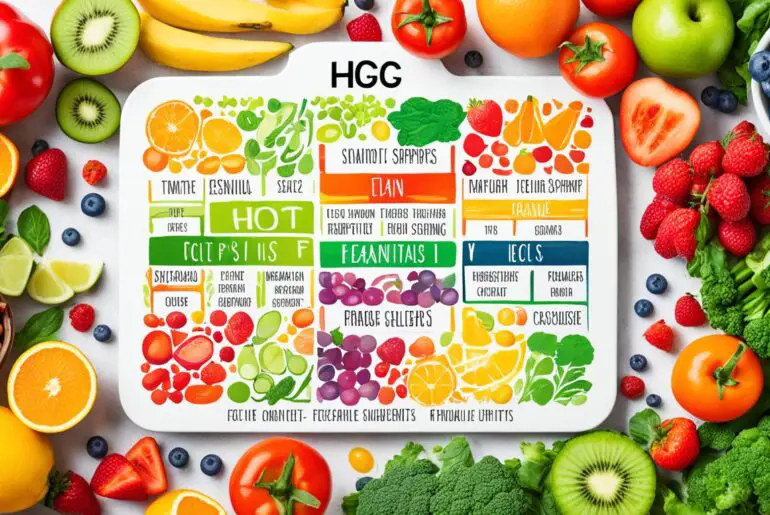Did you know that the HCG diet and the keto diet are two of the most popular weight loss strategies? These approaches have gained significant attention for their effectiveness in helping people shed unwanted pounds and improve their overall health. But which one is more effective? And which one is right for you?
In this comprehensive comparison, I will explore the differences between the HCG diet and the keto diet, weigh their pros and cons, and help you make an informed decision about choosing the best weight loss option for your needs.
Key Takeaways:
- Both the HCG diet and the keto diet are popular weight loss strategies.
- The HCG diet focuses on rapid weight loss through a low-calorie diet and HCG hormone supplementation.
- The keto diet emphasizes a low-carb, high-fat eating plan that induces ketosis.
- Consider factors like sustainability, personal preferences, and health goals when choosing between the two diets.
- Consult with a healthcare professional before starting any weight loss program.
Understanding the Keto Diet
The ketogenic diet, commonly referred to as the keto diet, is a low-carb, high-fat eating plan that aims to induce ketosis. By significantly reducing carbohydrate intake, the body switches its primary energy source from carbohydrates to fat. This metabolic state is at the core of the keto diet’s effectiveness for fat burning.
The keto diet is based on the principle that when the body is deprived of carbohydrates, it enters a state of ketosis. During ketosis, the liver produces ketones, which are molecules that serve as an alternative fuel source for the body. In the absence of carbohydrates, the body starts burning stored fat for energy, leading to weight loss.
There is growing scientific evidence supporting the effectiveness of the keto diet for weight loss and the treatment of obesity. Studies have shown that this high-fat, low-carbohydrate diet can lead to substantial weight loss and improved metabolic health. Additionally, the keto diet has been found to have benefits for various health conditions, including epilepsy, type 2 diabetes, and cardiovascular disease.
It’s important to note that the keto diet is a high-fat diet, with healthy fats replacing carbohydrates as the primary source of calories. This means that foods like avocados, cheese, nuts, and fatty fish are encouraged, while carbohydrates, such as grains, legumes, and sugary foods, are limited.
Overall, the keto diet offers a unique approach to weight loss by modifying the body’s metabolism and promoting fat burning. However, it’s important to consult with a healthcare professional or registered dietitian before starting any diet plan, especially if you have underlying medical conditions.
Understanding the HCG Diet

The hCG diet is a weight loss strategy that combines a low-calorie diet with hCG hormone supplementation. This approach aims to achieve rapid weight loss by targeting fat stores in the body. The hCG hormone, also known as human chorionic gonadotropin, is believed to help break down fat and promote the release of stored calories. This rapid weight loss is achieved by consuming a low-calorie diet, typically around 500-800 calories per day, which triggers the body to utilize its fat stores for energy.
However, it’s important to note that the safety and long-term effectiveness of the hCG diet have been a topic of debate. Some experts express concerns about the extremely low-calorie intake and the potential risks associated with hCG hormone supplementation. It’s crucial to consult a healthcare professional before embarking on this diet or any weight loss journey.
“The hCG diet is an intriguing approach to weight loss, but it’s essential to consider the potential risks and consult with a healthcare professional to ensure its safety and effectiveness for your specific needs.”
Personalized guidance is crucial when considering the hCG diet. A healthcare professional can evaluate your unique needs, health status, and weight loss goals to determine if this diet is suitable for you. They can provide valuable advice on adjusting caloric intake, monitoring hormone levels, and ensuring overall well-being throughout the process. Remember, what works for one person may not work for another, emphasizing the need for personalized guidance when exploring weight loss strategies.
Benefits of the hCG Diet
The hCG diet offers several potential benefits, including:
- Rapid weight loss: The combination of a low-calorie diet and hCG hormone supplementation may lead to significant weight loss in a short period. This can provide motivation and kickstart a weight loss journey.
- Targeted fat loss: The hCG hormone is believed to help target fat stores, promoting fat loss while preserving muscle mass.
- Structured approach: The hCG diet offers a structured eating plan that can be helpful for individuals who prefer having clear guidelines and rules to follow.
Potential Risks and Considerations
While the hCG diet may offer rapid weight loss, it’s important to be aware of the potential risks and considerations:
- Low-calorie intake: Consuming only 500-800 calories per day can be challenging and may lead to nutrient deficiencies or metabolic imbalances.
- Safety concerns: Some experts question the safety and long-term effects of hCG hormone supplementation. The use of hormones should always be approached with caution and under medical supervision.
- Limited scientific evidence: The hCG diet’s effectiveness and safety have not been extensively studied, making it difficult to draw definitive conclusions.
- Lack of sustainable habits: The hCG diet is typically a short-term approach focused on rapid weight loss. Developing sustainable habits and maintaining long-term weight loss may require additional strategies and lifestyle changes.
| Pros | Cons | |
|---|---|---|
| Rapid weight loss | + Immediate results + Motivation boost |
– Potential nutrient deficiencies – Metabolic imbalances |
| Targeted fat loss | + Preserves muscle mass + Promotes fat burning |
– Safety concerns with hCG hormone supplementation |
| Structured approach | + Clear guidelines to follow | – Limited scientific evidence for effectiveness and safety – Short-term focus may not promote long-term habits |
Comparing Similarities and Differences
When it comes to weight loss strategies, the hCG diet and the keto diet share the common goal of inducing ketosis, a metabolic state where the body uses fat stores as an energy source. However, the approaches to achieving ketosis differ between the two diets.
The keto diet relies on a low-carb, high-fat eating plan to trigger ketosis. By significantly reducing carbohydrate intake, the body is forced to burn fat instead of glucose for fuel. This shift in metabolism promotes fat burning and can lead to significant weight loss.
The hCG diet, on the other hand, combines a low-calorie diet with hCG hormone supplementation to achieve weight loss. While the precise mechanism is not fully understood, the hCG hormone is believed to target fat stores and promote rapid weight loss.
Both diets emphasize fat burning and restrict carbohydrate intake. However, it is important to note that the hCG diet is typically a short-term approach, lasting around 3-6 weeks, while the keto diet is often adopted as a long-term lifestyle change.
Another important consideration when comparing these diets is nutrient density. The keto diet focuses on consuming nutrient-rich foods, such as avocados, nuts, and leafy green vegetables, to ensure adequate vitamin and mineral intake. On the other hand, the hCG diet may be more limited in terms of food choices, potentially leading to nutrient deficiencies if not carefully monitored.
In summary, while both the hCG diet and the keto diet induce ketosis and promote fat burning, their approaches, duration, and nutrient density differ. It is important to consider individual preferences, lifestyle factors, and overall health when choosing the most suitable weight loss option.
| Diet | Approach to Ketosis | Duration | Nutrient Density |
|---|---|---|---|
| Keto Diet | Low-carb, high-fat eating plan | Long-term lifestyle change | Emphasizes nutrient-rich foods |
| hCG Diet | Low-calorie diet with hCG hormone supplementation | Short-term (3-6 weeks) | Potentially limited nutrient variety |
Pros and Cons of HCG Diet and Keto Diet
When considering weight loss options, it’s important to evaluate the pros and cons of each approach. Both the hCG diet and the keto diet offer unique benefits and considerations. Let’s take a closer look at the advantages and disadvantages of these two diets:
Pros of the hCG Diet
- Rapid Weight Loss: The hCG diet is known for its ability to promote quick weight loss results.
- Immediate Results: Many individuals experience significant weight loss in a short period of time.
- Preserved Muscle Mass: The hCG hormone is believed to help preserve muscle mass while targeting fat stores.
Cons of the hCG Diet
- Sustainability: The low-calorie and low-fat nature of the hCG diet may not be suitable for long-term adherence.
- Potential Side Effects: HCG hormone supplementation can have side effects and risks, including headaches, fatigue, and hormonal imbalances.
- Limited Research: There is limited scientific evidence on the long-term health effects and safety of the hCG diet.
Pros of the Keto Diet
- Sustainable Weight Loss: The keto diet offers a sustainable approach to weight loss, making it easier to maintain in the long run.
- Metabolic Health Benefits: The ketogenic state achieved through the diet has been linked to improved metabolic health markers.
- Flexible Food Choices: The keto diet allows for a variety of delicious and satisfying low-carb, high-fat food options.
Cons of the Keto Diet
- Initial Transition Phase: Some individuals may experience side effects such as the “keto flu” during the adaptation period.
- Not Suitable for Everyone: The keto diet may not be suitable for individuals with certain medical conditions or those who have difficulty adhering to a strict eating plan.
- Long-Term Health Effects: While there are short-term benefits of the keto diet, the long-term health effects are still being studied.
Ultimately, the choice between the hCG diet and the keto diet depends on personal preferences, health goals, and individual circumstances. It’s important to consider factors such as rapid weight loss, sustainability, side effects, and long-term health effects before making a decision. Consulting with a healthcare professional can provide personalized guidance and help determine the best weight loss option for you.
Choosing the Best Weight Loss Option

The choice between the hCG diet and the keto diet depends on personal preferences, health goals, and individual circumstances. It’s important to consider factors such as weight loss preferences, dietary restrictions, and sustainability.
When deciding on the best weight loss option for you, take into account your personal preferences. Some individuals may prefer the structure and low-calorie approach of the hCG diet, while others may find the flexibility and higher-fat content of the keto diet more appealing.
Ultimately, the decision should align with your health goals. Are you looking for rapid weight loss with the hCG diet or a more sustainable approach with the keto diet? It’s crucial to choose a plan that is in line with your long-term objectives.
Considering dietary restrictions is also essential. If you have specific food allergies or intolerances, the keto diet may offer more flexibility with its focus on healthy fats and moderate protein intake. Conversely, the hCG diet may have a more limited food selection due to its low-calorie approach.
Another crucial aspect is sustainability. While the hCG diet may promise quick results, it may not be suitable for long-term adherence. The keto diet, on the other hand, can be adopted as a lifestyle choice with potential long-term health benefits.
Before embarking on any weight loss program, it is strongly recommended to consult with a healthcare professional, especially if you have underlying medical conditions. They can provide personalized advice and guidance based on your unique needs and health status.
| Factors to Consider | hCG Diet | Keto Diet |
|---|---|---|
| Weight Loss Preferences | Rapid weight loss | Steady and sustainable weight loss |
| Dietary Restrictions | May have limited food selection | Offers flexibility for specific dietary needs |
| Sustainability | Potentially challenging in the long term | Lifestyle approach with potential long-term benefits |
| Consultation with Healthcare Professional | Highly recommended | Highly recommended |
Conclusion
In conclusion, the hCG diet and the keto diet are two distinct approaches to weight loss, each with its own set of benefits and drawbacks. The hCG diet offers the appeal of rapid weight loss, but there are concerns about its long-term sustainability. On the other hand, the keto diet provides a more sustainable approach with the potential for long-term health benefits.
When considering which diet is best for you, it’s crucial to take into account your personal preferences, health goals, and consult with a healthcare professional. What works for one person may not be suitable for another, so it’s important to make an informed decision that aligns with your unique circumstances.
Ultimately, your well-being should always be the top priority. Both the hCG diet and the keto diet have their merits, but it’s vital to consider factors such as sustainability, side effects, and whether the diet aligns with your lifestyle and dietary preferences. By carefully weighing these factors and seeking professional advice, you can make an educated decision on the best weight loss option for you.
FAQ
What is the keto diet and how does it work?
The keto diet is a low-carb, high-fat eating plan that aims to induce ketosis, a metabolic state where the body burns fat for energy instead of carbohydrates.
What is the hCG diet and how does it work?
The hCG diet combines a low-calorie diet with hCG hormone supplementation to achieve rapid weight loss by targeting fat stores.
What are the similarities between the hCG diet and the keto diet?
Both diets aim to induce ketosis, limit carbohydrate intake, and emphasize fat burning as a primary source of energy.
What are the differences between the hCG diet and the keto diet?
The hCG diet is a short-term, low-calorie, and low-fat approach, while the keto diet is often considered a long-term lifestyle change with a high-fat eating plan.
What are the pros and cons of the hCG diet?
The hCG diet offers rapid weight loss results, but its sustainability and long-term effectiveness are a concern. There are also potential side effects and risks associated with hCG hormone supplementation.
What are the pros and cons of the keto diet?
The keto diet provides a sustainable approach to weight loss and has been linked to improved metabolic health. However, it may not be suitable for everyone, and there can be side effects such as the keto flu during the transition phase. Long-term health effects are still being studied.
How do I choose the best weight loss option between the hCG diet and the keto diet?
The choice depends on personal preferences, health goals, and individual circumstances. It’s important to consider factors such as weight loss preferences, dietary restrictions, and sustainability. Consultation with a healthcare professional is highly recommended before starting any weight loss program.




